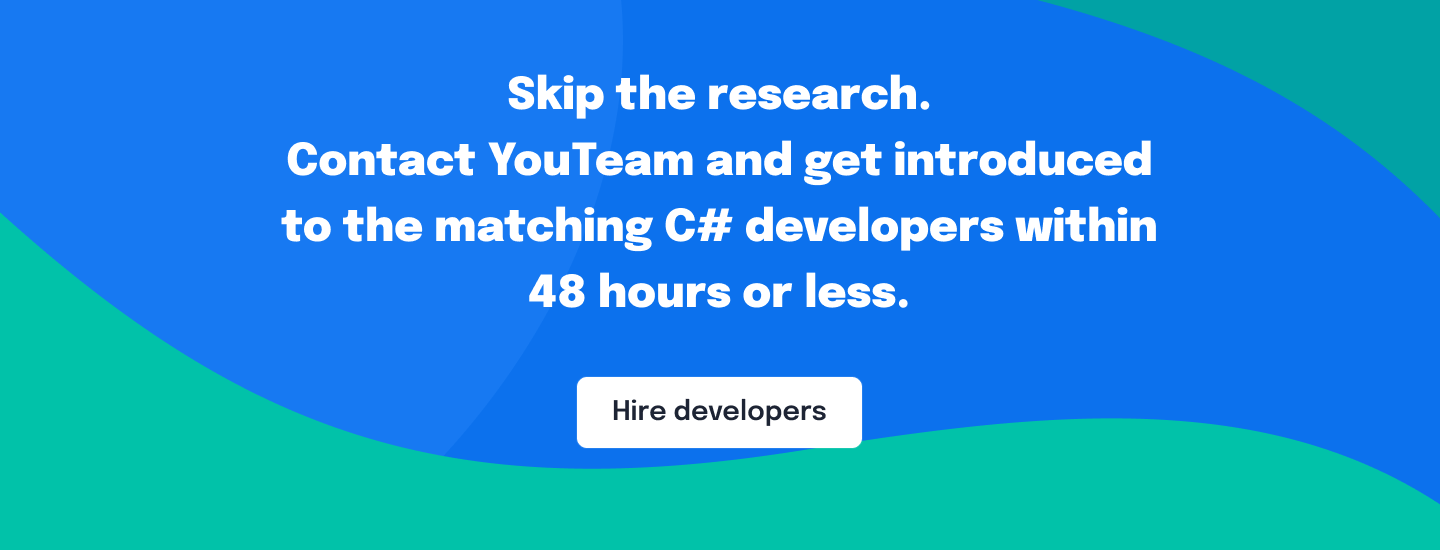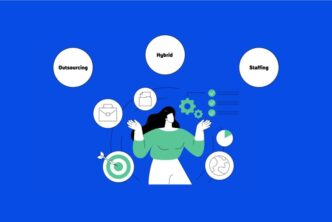C# and its associated frameworks, including .NET and ASP.NET, are powerful heavyweights thanks to Microsoft backing, an open-source nature, and contributions from thousands of developers and companies. Designed from the ground up to run on both desktop computers and IoT devices like a Raspberry Pi, C# has excellent libraries for fast development, cross-platform support, exception handling, and automated garbage collection, making it the ideal choice for enterprise software, game development, and mobile app development.
This article discusses the use cases and key advantages of C# and .NET development, helping you uncover a range of possibilities when building your next software. In addition, we provide success stories of C# and .NET implementation from industry giants such as Samsung, Stack Overflow, and GE Digital.
Table of Contents
An overview of C# development use cases
C# is a modern, object-oriented, and component-oriented programming language that enables developers to build various types of applications running on .NET, a free open-source software platform.
Since its initial release in 2000, the language has continuously evolved, adding features to support new workloads and emerging design practices. Several C# features, such as garbage collection, Language Integrated Query (LINQ), exception handling, and lambda expressions, support functional programming techniques, allow developers to work with data from any source, and provide a structured approach to error detection and recovery, ultimately helping create robust and durable applications.
.NET and C# are used for a wide range of applications, including:
- Full-stack web apps with HTML, CSS, JavaScript, and C#.
In addition, programmers can build interactive web user interfaces using C# instead of JavaScript with the help of Blazor, a feature of ASP.NET, the web framework for .NET. They can also create dynamic web content using HTML and C# with Razor Pages. - Native, cross-platform desktop and mobile apps in one common framework.
C# developers can leverage .NET Multi-platform App UI (.NET MAUI), a cross-platform framework for creating native apps on Windows, macOS, iOS, and Android, all from a single C# code base. .NET MAUI offers a collection of controls for displaying data, initiating actions, and indicating activity. It also features a layout engine for designing pages, supports data binding for more elegant and maintainable development patterns, and provides cross-platform APIs for accessing native device features like GPS, accelerometer, and battery and network states. - Windows desktop apps.
If developers are building an app that will only run on Windows, they might use the Windows UI Library (WinUI) 3, a user interface that supports C# and .NET. It incorporates the Fluent Design System, a design language that includes a more prominent use of motion, depth, and translucency effects in all experiences, controls, and styles. This system provides intuitive and accessible experiences using the latest UI patterns. - Microservices.
ASP.NET offers built-in support for developing and deploying microservices that run on all major cloud platforms. Moreover, the microservices architecture allows a mix of technologies between each service. This means that .NET microservices can work side-by-side with modules written in Node.js, Java, Go, or any other programming language. - Machine learning and AI.
.NET developers can utilize ML.NET, a cross-platform machine learning framework for training, building, and deploying custom models using C# or F#. The framework proves valuable across different scenarios, including sentiment analysis, price prediction, product recommendation, sales forecasting, image classification, and object detection. Software developers can also explore Azure AI services, a suite of pre-built and customizable AI tools, APIs, and models, including features for computer vision, language understanding, speech transcription, and intelligent search. - Game development.
.NET and C# help game developers across the entire game development cycle, from building the actual game to its online services and mobile app. With .NET, they can target Xbox, PlayStation, and Nintendo consoles, as well as mobile devices, Windows, and MacOS platforms. There are a range of multi-platform frameworks that use .NET and C# for game development, photo-realistic 3D rendering, and physics simulation, including Unity, MonoGame, Stride, CRYENGINE, and UNIGINE. - Internet of Things (IoT) applications
C# and .NET power IoT devices like Raspberry Pi, HummingBoard, BeagleBoard, and Pine A64. .NET IoT libraries fully support temperature and humidity sensors, accelerometers, gas sensors, and RFID modules.
The advantages of using C# for your project
C# and .NET are commonly described by programmers as highly scalable technologies with fast development times, multi-platform support, and a strong community. In this section, we discuss the most critical advantages of using the C# and .NET ecosystem in detail.
Support for all major platforms
With C# and .NET, software development teams can target applications running on various platforms. These applications range from apps for iOS, Android, and Windows, to enterprise server applications running on Windows Server and Linux, or microservices running in the cloud. Developers can efficiently reuse their skills and code across all these platforms in a familiar environment.
Productivity
C# was designed with developer productivity and application scalability in mind. The language features an extensive library and encompasses static typing, strong typing, object-oriented, and component-oriented programming disciplines.
Recognition among developers
According to Stack Overflow Developer Survey 2023, C# is in the top 10 most popular programming languages for both professional developers and learning to code, while .NET and .NET MAUI are top frameworks programmers want to use next year.
Active community
.NET is managed by the .NET Foundation, an independent organization that promotes open development and collaboration across the .NET ecosystem. Being open source, .NET has attracted contributions from thousands of developers and companies, who have helped improve the framework by reporting issues and submitting pull requests.
A selection of development tools and extensions
The Visual Studio product family consists of .NET development tools designed for macOS, Windows, and Linux. The Visual Studio Marketplace offers a collection of editor extensions created by both Microsoft and third-party companies, enhancing the functionality of the coding environment. These extensions can be controls, samples, templates, and coding assistants. If a development team prefers to use an alternative code editor, there are .NET plug-ins for many popular IDEs.
For more information about C# and .NET platform features, please visit the official resource page.
Top 5 biggest companies using C# and .NET
Besides powering Microsoft-developed services such as Microsoft Graph, Bing, Power BI, and Microsoft Teams, and being used in Xbox Game Studios projects, C# and .NET have also been adopted by highly prominent companies like Samsung and Stack Overflow.
Samsung
In 2016, Samsung announced a collaboration with Microsoft to integrate .NET Core support and Visual Studio Tools for Tizen, an operating system used in the company’s Smart TVs, computer monitors, and IoT devices. The Tizen .NET framework is designed for optimal speed and low resource usage, allowing developers to use the C# programming language and adhere to Common Language Infrastructure standards. The framework includes NUI (Natural User Interface), a hardware-accelerated C# toolkit featuring a range of predefined components and layouts for building GUIs in both 2D and 3D modes.
Stack Overflow
In 2019, Stack Overflow ported their entire application to .NET Core, aiming to enhance performance and add more modularity to the different sections of the app. Another factor that attracted them to .NET Core was its testability, allowing engineers to conduct end-to-end, server, and client method tests. With a need to scale with even greater speed and agility
Academy of Motion Picture Arts and Sciences
The Academy of Motion Picture Arts and Sciences, best known for its annual Academy Awards, began using technology as their strategic asset in the mid-2010s. They centralized their software development and IT infrastructure teams and launched a member portal. Initially, they developed .NET Framework apps with SQL Server backends and later migrated to the Azure cloud platform.
In addition, the Academy turned to Xamarin for their member streaming application, targeting multiple platforms at once. Their developers utilized native Xamarin C# code for the tvOS app and Xamarin.Forms for iOS and Android. This approach allowed them to power all three apps with the same backend services, reusing 50-60 percent of the codebase.
Siemens Healthineers
Siemens Healthineers, a global healthcare technology company, has been building applications using C# and .NET Framework for a long time. However, their software solutions were initially limited to the Windows platform. With the release of .NET Core, they were able to run the software on a wide spectrum of devices, reducing operational costs in the cloud as they could run some workloads on Linux machines.
GE Digital
GE Digital, a subsidiary of General Electric that provides software and internet of things (IoT) services to industrial companies, developed FlightPulse, an app that provides data and analytics for Qantas Airways pilots to help them improve safety and efficiency during flights. GE built the back-end APIs for the app using ASP.NET Core. They also used Blazor to build the Config Console App that enables flight safety and efficiency departments to configure and aggregate the data pilots observe. This ultimately provides the company with a wealth of collective experience from across the airline.
Wrapping up
C# is an object-oriented and component-oriented language that enables developers to build applications running on the .NET framework. It allows working with data from any source and provides a structured approach to error detection and recovery. C# and the associated .NET ecosystem are used for a wide range of applications, including web development, cross-platform mobile development, machine learning, and Internet of Things (IoT) applications.
The language features an extensive library, follows component-oriented programming disciplines, provides support for all major platforms, and offers a selection of related development tools and extensions. C# consistently ranks among the top 10 most popular programming languages for both professional developers and those learning to code. In addition, the .NET Foundation actively promotes open development and collaboration across the .NET ecosystem, attracting contributions from thousands of developers and companies.






